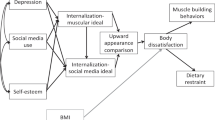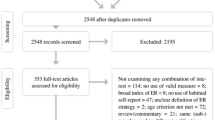Abstract
Eating disorder symptomology is a significant problem on college campuses (Choate, Journal of College Counseling, 13, 73–86, 2010; Meyer 2005). Understanding factors that predict eating disorder symptomology may be useful in determining treatment approaches and in supporting prevention efforts. Recent research indicates that individuals with eating disorders report lower levels of self-forgiveness (Watson et al., Eating Behaviors, 14, 224–228, 2012). In this brief report, the relation of eating disorder symptomology to self, other, and situation forgiveness was examined. College students (n = 294) completed the Eating Attitudes Test (EAT-26: Garner, Olmsted, Bohr, and Garfinkel Biological Psychiatry, 61, 348–358, 1982) and the Heartland Forgiveness Scale (HFS; Thompson et al., International Journal of Eating Disorders, 47, 252–258, 2005). Findings indicated significant negative correlations between eating disorder symptomology and self, other, and situation forgiveness. In a multiple regression with gender, self, other, and situation forgiveness as predictors of eating disorder symptomology, gender, self-forgiveness, and other forgiveness were significant predictors, indicating that women, participants lower in self-forgiveness, and participants lower in other forgiveness reported higher rates of eating disorder symptomology.
Similar content being viewed by others
References
Baer, R. A., Fischer, S., & Huss, D. B. (2005). Mindfulness and acceptance in the treatment of disordered eating. Journal of Rational-Emotive & Cognitive-Behavior Therapy, 23, 281–300. doi:10.1007/s10942-005-0015-9.
Centers for Disease Control and Prevention (CDC) (last updated: August 13, 2012). Adult Obesity Facts: Obesity prevalence in 2011 varies across states and regions. Retrieved from: http://www.cdc.gov/
Choate, L. H. (2010). Counseling college women experiencing eating disorder not otherwise specified: a cognitive behavior therapy model. Journal of College Counseling, 13, 73–86.
Enright, R. D. (1996). Counseling within the forgiveness triad: on forgiving, receiving, forgiveness, and self-forgiveness. Counseling and Values, 40, 107–126.
Enright, R. D., & Fitzgibbons, R. P. (2000). Forgiveness in eating disorders. Helping clients forgive: An empirical guide for resolving anger and restoring hope, 215-223. Washington, DC US: American Psychological Association.
Ferrier-Auerbach, A. G., & Martens, M. P. (2009). Perceived incompetence moderates the relationship between maladaptive perfectionism and disordered eating. Eating Disorders: The Journal of Treatment & Prevention, 17, 333–344. doi:10.1080/10640260902991244.
Garner, D. M., Olmsted, M. P., Bohr, Y., & Garfinkel, P. E. (1982). The eating attitudes test: psychometric features and clinical correlates. Psychological Medicine, 12, 871–878.
Hudson, J. I., Hiripi, E., Pope, H. G., & Kessler, R. C. (2007). The prevalence and correlates of eating disorders in the national comorbidity survey replication. Biological Psychiatry, 61, 348–358. doi:10.1016/j.biopsych.2006.03.040.
Jacobi, C., Abascal, L., & Taylor, C. (2004). Screening for eating disorders and high-risk behavior: caution. International Journal of Eating Disorders, 36, 280–295.
Juarascio, A. S., Perone, J., & Timko, C. (2011). Moderators of the relationship between body image dissatisfaction and disordered eating. Eating Disorders: The Journal of Treatment & Prevention, 19, 346–354. doi:10.1080/10640266.2011.584811.
Kahn, J. H., & Williams, M. N. (2003). The impact of prior counseling on predictors of college counseling center use. Journal Of College Counseling, 6, 144–154.
Karremans, J. C., & Lange, P. (2008). Forgiveness in personal relationships: its malleability and powerful consequences. European Review of Social Psychology, 19, 202–241. doi:10.1080/10463280802402609.
Lander, A. (2012). Toward the incorporation of forgiveness therapy in healing the wounds of eating disorders: a case study in self-forgiveness. Clinical Case Studies, 11, 119–139.
Macaskill, A. (2007). Exploring religious involvement, forgiveness, trust, and cynicism. Mental Health, Religion & Culture, 10, 203–218.
Meyer, D. F. (2005). Psychological correlates of help seeking for eating-disorder symptoms in female college students. Journal of College Counseling, 8, 20–30. doi:10.1002/j.2161-1882.2005.tb00069.x.
Sesan, R. (2009). Forgiveness: The final frontier in recovery from an eating disorder. In M. Maine, W. N. Davis, & J. Shure (Eds.), Effective clinical practice in the treatment of eating disorders: The heart of the matter (pp. 235–248). New York, NY: Routledge/Taylor & Francis Group.
Stein, R. I., Kenardy, J., Wiseman, C. V., Dounchis, J., Arnow, B. A., & Wilfley, D. E. (2007). What’s driving the binge in binge eating disorder?: a prospective examination of precursors and consequences. International Journal of Eating Disorders, 40, 195–203.
Taylor, M., Bates, G., & Webster, J. D. (2011). Comparing the psychometric properties of two measures of wisdom: predicting forgiveness and psychological well-being with the self-assessed wisdom scale (SAWS) and the three dimensional wisdom scale (3D-WS). Experimental Aging Research, 37, 129–141.
Thompson, L. Y., & Snyder, C. R. (2003). Heartland forgiveness scale. In S. L. Lopez & C. R. Snyder (Eds.), Positive psychological assessment: A handbook of models and measures (p. 310). Washington, DC: American Psychological Association.
Thompson, L., Snyder, C. R., Hoffman, L., Michael, S. T., Rasmussen, H. N., Billings, L. S., Heinze, L., Neufeld, J. E., Shorey, H. S., Roberts, J. C., & Roberts, D. E. (2005). Dispositional forgiveness of self, others, and situations. Journal of Personality, 73, 313–359.
Tomba, E., Offidani, E., Tecuta, L., Schumann, R., & Ballardini, D. (2014). Psychological well-being in out-patients with eating disorders: a controlled study. International Journal of Eating Disorders, 47, 252–258. doi:10.1002/eat.22197.
Wade, T., George, W. M., & Atkinson, M. (2009). A randomized controlled trial of brief interventions for body dissasatisfaction. Journal of Consulting and Clinical Psychology, 77, 845–854. doi:10.1037/a0016879.
Watson, M. J., Lydecker, J. A., Jobe, R. L., Enright, R. D., Gartner, A., Mazzeo, S. E., & Worthington, E. L., Jr. (2012). Self-forgiveness in anorexia nervosa and bulimia nervosa. Eating Disorders: The Journal of Treatment & Prevention, 20(1), 31–41.
Webb, J. B., & Forman, M. J. (2013). Evaluating the indirect effect of self-compassion on binge eating severity through cognitive-affective self-regulatory pathways. Eating Behaviors, 14, 224–228.
Worthington, E. R., Mazzeo, S. E., & Kliewer, W. L. (2002). Addictive and eating disorders, unforgiveness, and forgiveness. Journal of Psychology and Christianity, 21, 257–261.
Author information
Authors and Affiliations
Corresponding author
Electronic supplementary material
Below is the link to the electronic supplementary material.
ESM 1
(DOCX 25 kb)
Rights and permissions
About this article
Cite this article
Feibelman, J.L., Turner, L.A. Relationships Between Eating Disorder Symptomology and Forgiveness Among College Students. Curr Psychol 34, 121–129 (2015). https://doi.org/10.1007/s12144-014-9245-2
Published:
Issue Date:
DOI: https://doi.org/10.1007/s12144-014-9245-2




